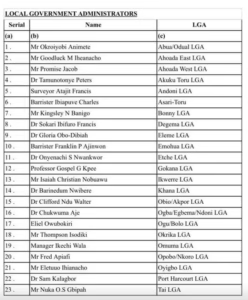Rivers State Sole Administrator, Vice Admiral Ibok-Ete Ibas (retd.), has appointed administrators for all 23 Local Government Areas (LGAs) of the state, despite a recent court order restraining him from doing so.
The announcement was made in a special government statement issued on Wednesday, detailing the immediate effect of the appointments. Mr. Okroiyobi Animete was appointed for Abua/Odual LGA, Mr. Goodluck M. Iheanacho for Ahoada East LGA, and Mr. Promise Jacob for Ahoada West LGA, among others.
This development follows less than 24 hours after a Federal High Court sitting in Port Harcourt issued a restraining order against the appointments. The court’s ruling, handed down by Justice Adam Muhammed, was in response to a case filed by the PILEX Centre for Civic Education Initiative, led by Courage Msirimovu. The lawsuit sought to block Ibas from appointing administrators to oversee the local councils, claiming the actions were unconstitutional.

Despite the court order, Ibas, through a statement signed by the Secretary to the State Government, Prof. Ibibia Worika, confirmed that the appointments of the 23 administrators would proceed. The sole administrator also approved the reconstitution of boards for several state agencies, commissions, and parastatals, which had been previously suspended.
The appointments, effective from Monday, April 7, 2025, come after a week of significant administrative changes in the state. Last week, Ibas suspended all heads of Ministries, Departments, and Agencies (MDAs) in Rivers State, and also canceled pending procurement and tender processes initiated by the MDAs. These actions were taken following a Supreme Court ruling and the lack of an appropriation law during the period in question.
In addition to the changes in local government administration, Ibas instructed all MDAs involved in procurement processes to refund contractors who had paid fees for projects that were cancelled.
The political landscape in Rivers State continues to evolve with these administrative shifts, while the controversy surrounding the legality of some of these decisions remains unresolved.


